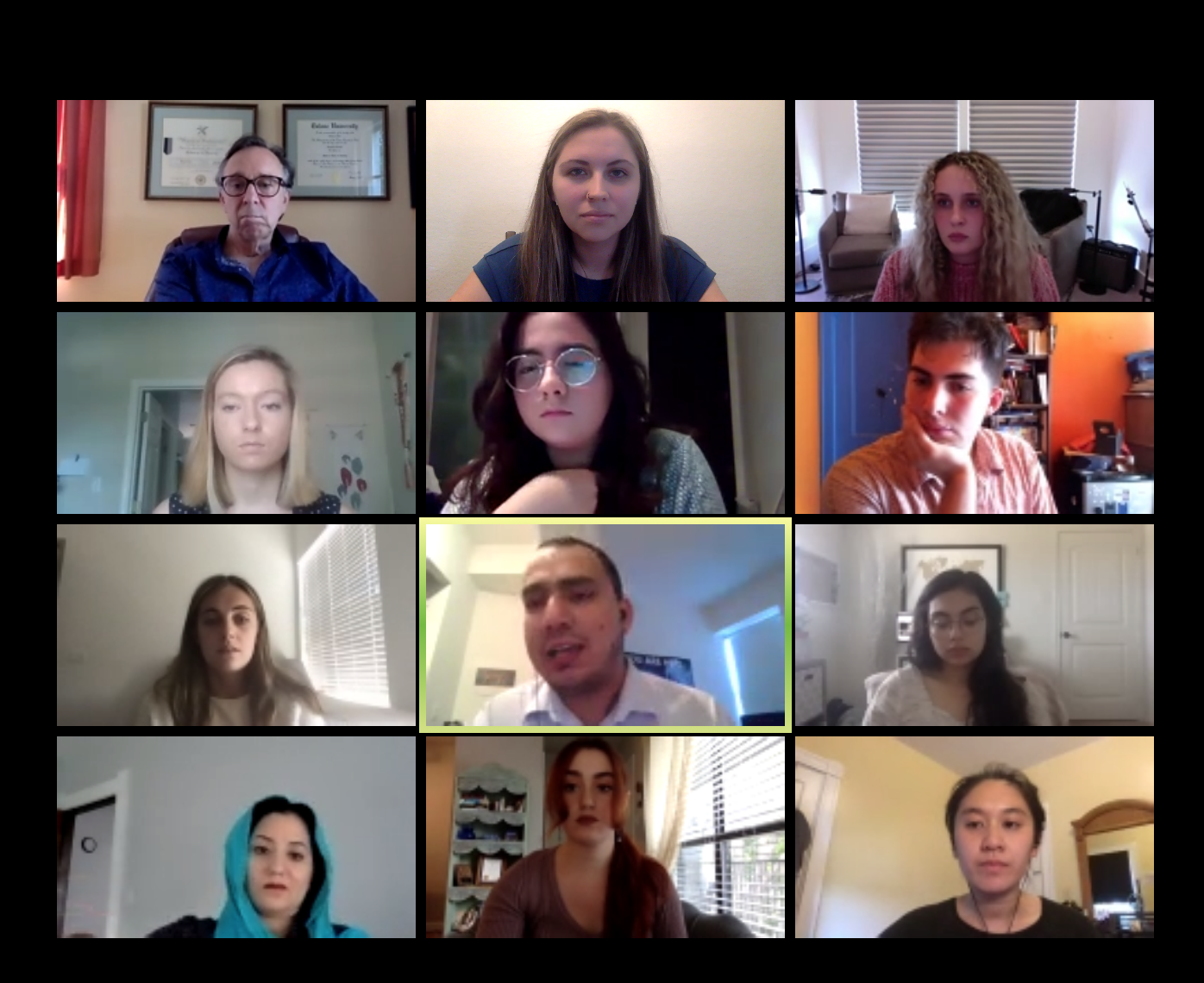2020 Annual Report
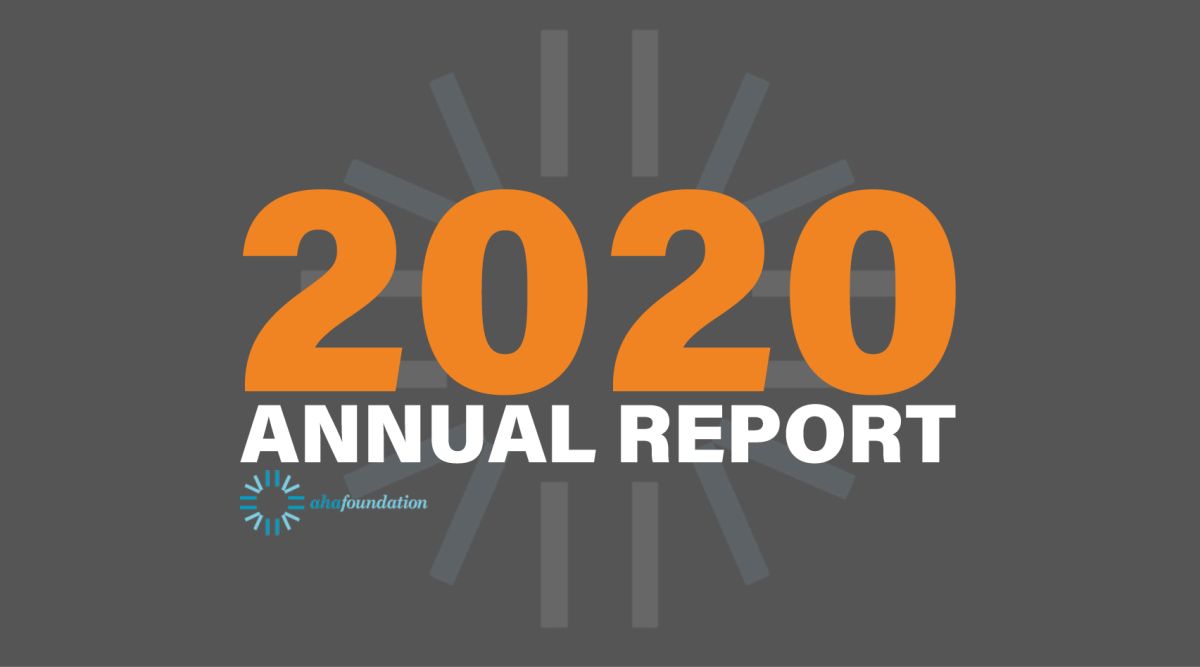
Table of Contents
A MESSAGE TO OUR DONORS

George Zarubin, Executive Director
Personally, as the pandemic progressed, I tried to limit my exposure to the constant news briefings that often felt overwhelming and at times debilitating. I felt that I had to focus on where I could make the biggest difference—my family, the work I do at AHA Foundation, and connections with friends and neighbors - online and socially distanced, as much as possible.
At AHA Foundation, we also had to focus on where we could do the most good. Thanks to support from our donors, our work protecting women and girls against harmful cultural practices and defending freedom of speech never ceased, despite many challenges.
The pandemic hit hard. The number of requests for help to our crisis text line tripled compared to the pre-COVID-19 period. The pandemic made it easier for perpetrators to continue their threats and abuse while girls are kept away from the watchful eyes of teachers, counselors and other professionals. Our staff worked hard to meet the needs of women and girls reaching out to us via our email helpline or through the crisis text line.
News of Congress unanimously passing the STOP FGM Act of 2020 in mid-December could not have come at a better, albeit surprising time. Despite growing fear that it would remain stuck in the Senate as the end of the lame-duck session drew near, Congress joined together in a bipartisan move to reaffirm the protection of women and girls throughout the U.S. The bill was officially signed into law by President Donald Trump on January 5, 2021.

2020 HIGHLIGHTS
- Helped pass a federal anti-FGM ban through the House of Representatives and Senate through advocacy with survivors and other partners—the bill reaffirms the federal FGM ban that was found unconstitutional in 2018.
- Spearheaded the efforts that resulted in five more states enacting or strengthening anti-FGM legislation in 2020 due to our role as the national leader in anti-FGM advocacy.
- Aided state-level efforts that resulted in two states banning child marriage.
- Supported federal legislation that, if passed, would close visa loopholes that have enabled thousands of child marriages in the U.S.
- Conducted a webinar with Dr. Muhammad Fraser-Rahim, Executive Director of Quilliam North America, about his new book to further strengthen and amplify the voices and activism of ex-Muslims, Muslim reformers, scholars and religious leaders against Islamism.
- Organized four events with fellows on 15 college campuses defending free speech and promoting critical thinking and women’s rights around the country, connecting more than 590,000 people with our events and ideas.
- Published in internationally and nationally-renowned newspapers and magazines, our founder Ayaan Hirsi Ali defended free speech against cancel culture in seven articles, exposed the dangers of Islamism in six, and raised awareness for gender-based violence in two.
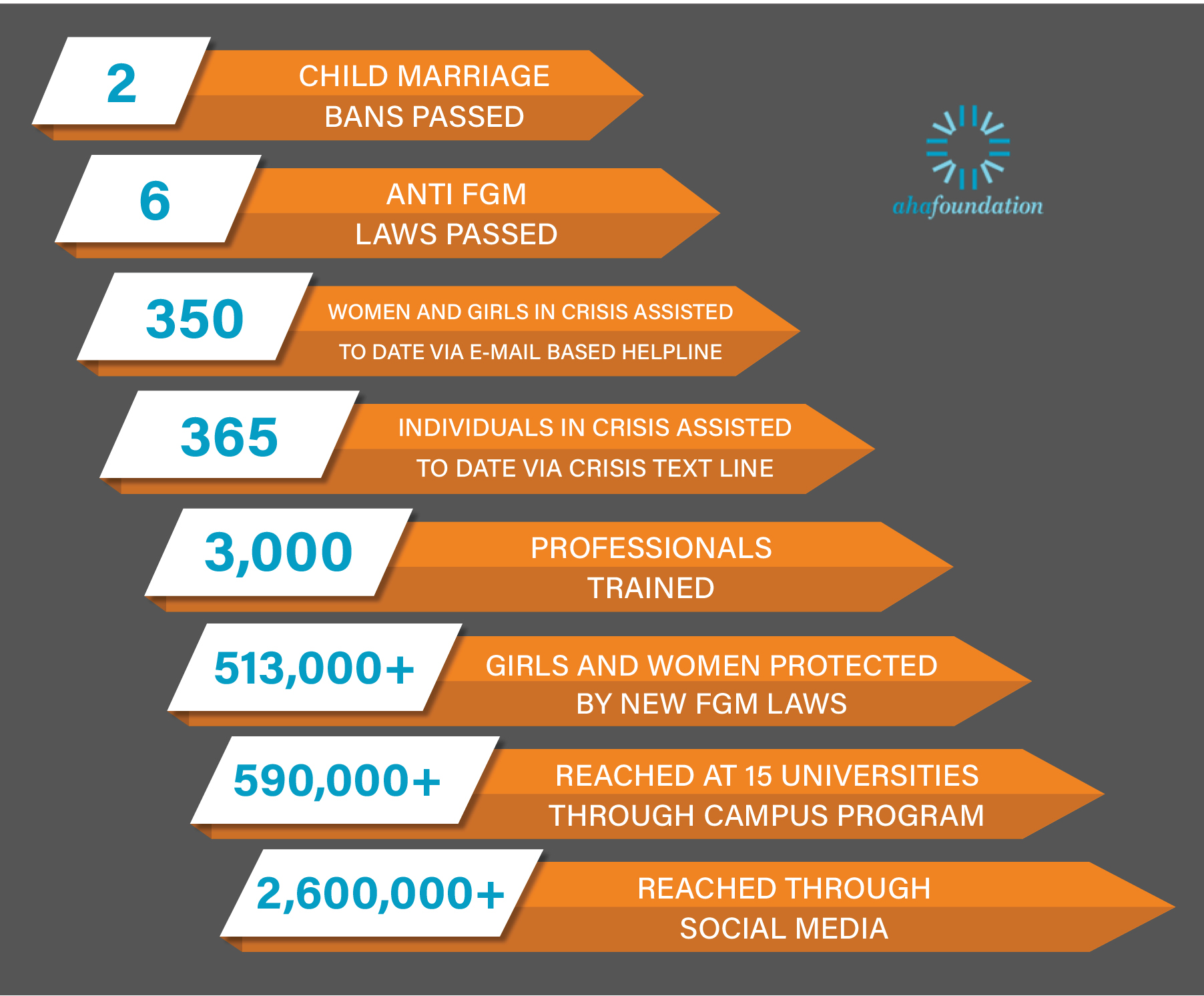

ENDING FEMALE GENITAL MUTILATION IN THE U.S.
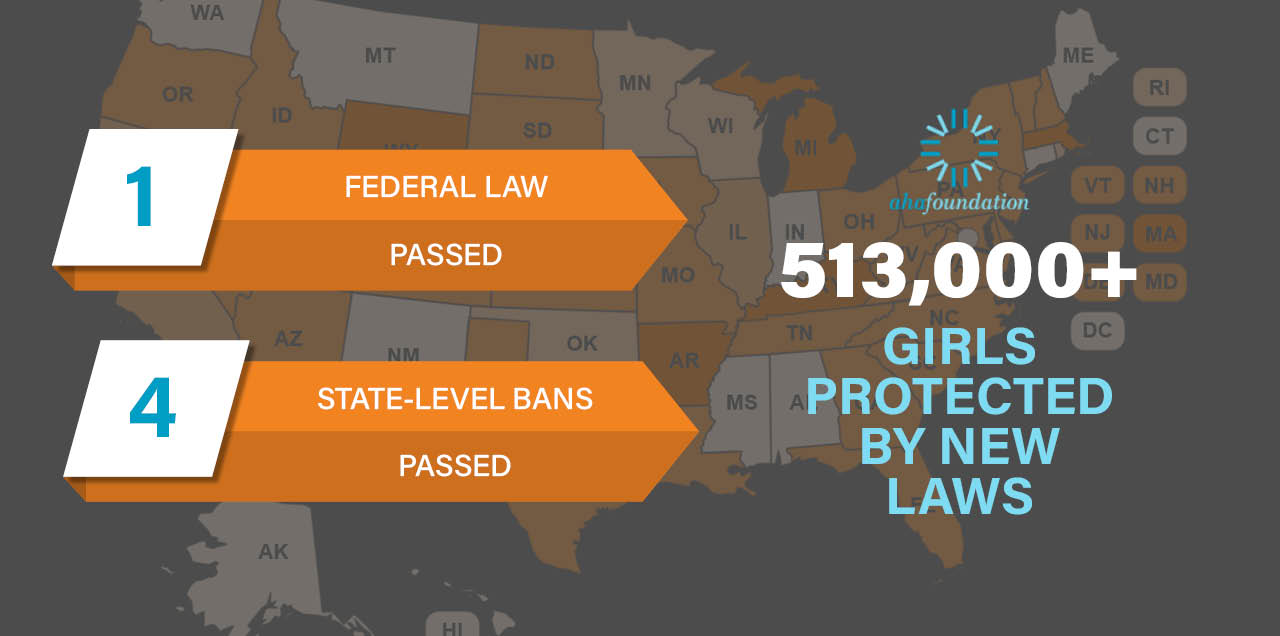
ANTI-FGM EFFORTS AT THE FEDERAL LEVEL
Against All Odds, an Incredible Victory: Stop FGM Act of 2020 Passed
In 2018, we lost the ability to try perpetrators using the federal law meant to protect girls from the heinous crime of FGM after a judge ruled it unconstitutional. Since then, AHA Foundation has been on the front line working with members of both parties in the Senate and House of Representatives to help reaffirm this ban. Thanks to our efforts and the work of our partners, the ban passed unanimously in the House of Representatives and in the Senate, and was signed by President Trump on January 5, 2021. This bill represents what can be accomplished through bipartisan efforts and reaffirms our commitment to ensure politics do not dictate the protection of women and girls throughout the U.S.
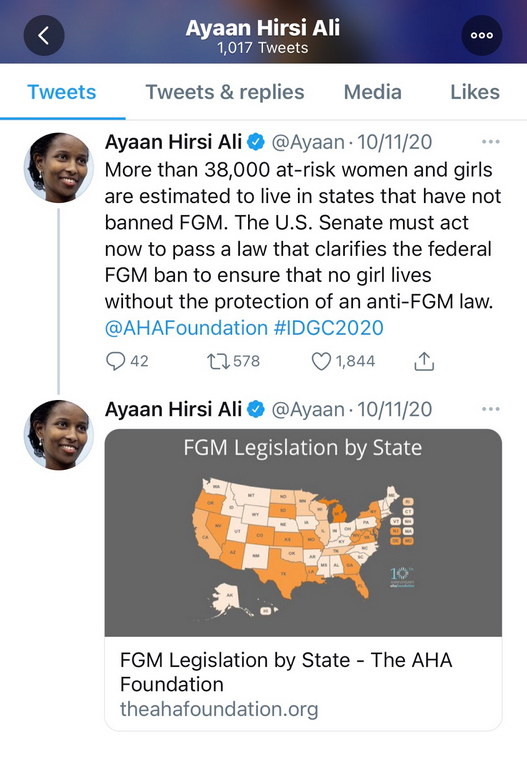
In a tweet on October 11, the International Day of the Girl Child, Ayaan Hirsi Ali, founder of AHA Foundation, urged the U.S. Senate to pass a bill that will reaffirm federal anti-FGM law.
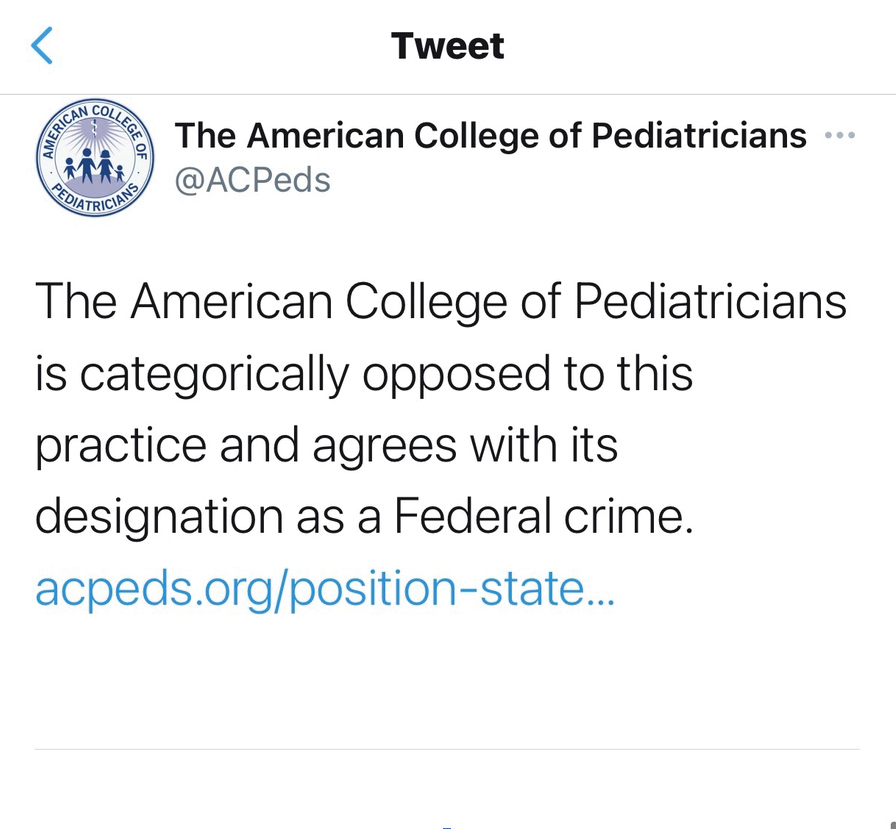
In response to our call for advocacy on Twitter to pass the STOP FGM Act of 2020, the American College of Pediatricians announced their support of the bill and efforts to pass it.
FGM Survivors, Legislators and Advocates React to the News About Federal Ban Victory
ANTI-FGM EFFORTS AT THE STATE LEVEL
COVID-19 Pandemic Slows Our Plans to Ban FGM in All 50 States, But Does Not Deter Five States from Passing Anti-FGM Legislation
AHA again led the charge to enact anti-FGM legislation in all 50 states around the country. In the first few months of the year, we laid the groundwork to pass FGM bans in the remaining 15 states and the District of Columbia, which lacked a ban in the beginning of 2020.

ENDING CHILD MARRIAGE IN THE U.S.
FEDERAL CHILD MARRIAGE EFFORTS
Throughout 2020, we have supported legislation introduced by Senator Ron Johnson that, if passed, would close a dangerous loophole in federal law we identified and warned about in 2017. This loophole allows for a minor of any age to sponsor a spousal visa or to come to the U.S. on a marriage-based petition. An investigative report released in 2019 by the Senate Homeland Security and Governmental Affairs Committee showed that 8,686 petitions for marriage-based visas involving minors were approved, and, 95% of the time, girls were the younger party involved.
STATE-LEVEL CHILD MARRIAGE EFFORTS
An Uphill Battle Filled with Unease
The U.S. still has a long way to go in the fight to ban child marriage. Before this year, only two states, Delaware and New Jersey, banned all marriages under the age of 18 or the age of majority. However, despite the difficulties of the pandemic, two more states took a stand against this abuse and completely outlawed child marriage.
A Warning About the Possible Exploitation of Girls in the U.S. Due to Online Marriage Certificates
Due to challenges imposed by the COVID-19 pandemic, many states around the country passed bills allowing for marriage certificates to be issued online. In states that had not banned marriage below the age of majority, these bills, however, allowed for the possible exploitation of girls in the form of child marriages.
If you are aware of child marriages and don’t do anything as a legislator then you are just as guilty as the perpetrator.
In order to spread awareness on the issue, we spoke with three survivors of child marriage and shared their testimonies across social media, in our newsletter and on our website to alert the public about children at high risk of forced marriage.
Envisioning Legislative Advocacy Beyond 2020
During the last half of 2020, we took steps to ensure that next year sees increased progress on both the state and federal level. While we work to identify bill sponsors in states that lack FGM or child marriage bans, we have asked our supporters who have relationships with legislators to help our efforts by making connections. Through this approach, we’ve identified new bill sponsors in Nebraska, Indiana and New Mexico, with other states in discussion.
Our bipartisan approach to passing legislation to protect women and girls has been at the center of our legislative strategy and even though it poses challenges in some states, we believe that a bipartisan approach to defending the rights of the most vulnerable is the only way forward.

CRITICAL THINKING FELLOWSHIP
Breaking the Barriers to Free Speech and Critical Thinking on College Campuses
Our campus fellowship program, Critical Thinking Fellowship (CTF), defends freedom of speech, and promotes Enlightenment values and women’s rights in colleges and in public debate. This is achieved through the efforts of our CTF fellows who continue to break the barriers to open dialogue, free speech and critical thinking at 14 universities, including schools like Stanford, Columbia, University of Pennsylvania and Notre Dame. Despite the upheaval in school environments and the switch to virtual learning, the CTF made a seamless transition to digital events in 2020, reaching more than 590,000 people.
CTF Summer Training Program
To strengthen collaboration among the fellows, the CTF holds an annual in-person summer training where the fellows meet and discuss the ideas, issues and principles that brought them all together. This year, due to the COVID-19 pandemic, this event took place virtually, and despite various challenges, was once again a success. The fellows not only had the valuable opportunity to speak and bond amongst themselves, but also to hear from experts—guest speakers, survivors and advocates such as Dr. Zuhdi Jasser, former Wall Street Journal writer Asra Nomani, forced marriage survivor Yasmine Mohammad, and our Senior Director Amanda Parker.

IMPACT IN THE WORDS OF CTF FELLOWS
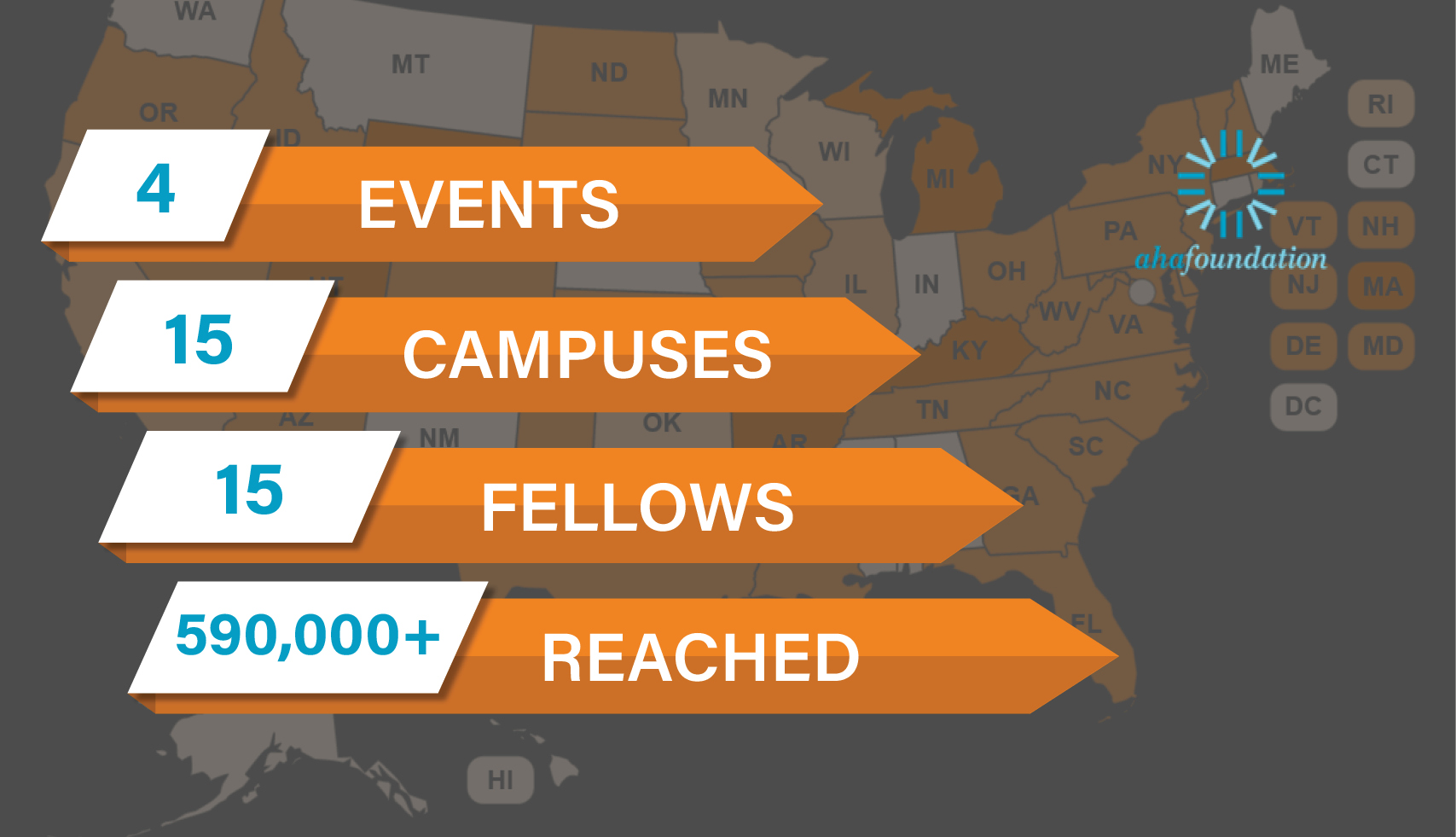

UNITING AND AMPLIFYING ACTIVISM AGAINST ISLAMISM
In light of recent terrorist attacks in Paris and Vienna, the conversations about the need for and urgency of combating the dangerous ideology of Islamism have been resurrected in the media. For AHA Foundation, our activism around combating Islamism has continued strong throughout the pandemic. Inspired by our founder’s vision, we unite and amplify voices, ideas and actions of Muslim reformers, ex-Muslims, scholars, activists and students working together toward a common goal. This year we continued to expand and strengthen this network through digital events and conference calls.
America’s Other Muslims: A Conversation Between Ayaan Hirsi Ali and Dr. Muhammad Fraser-Rahim
Ayaan Hirsi Ali, a former Muslim, advocate for a reformation of Islam and AHA Foundation founder, spoke in a webinar with Muhammad Fraser-Rahim, an American Muslim who has helped push back against radical Islam for the U.S. government and now Quilliam International.
In the webinar, the two discussed Fraser-Rahim’s newest book, “America’s Other Muslims: Imam W.D. Mohammed, Islamic Reform, and the Making of American Islam.” While about the book, the discussion, which featured questions from our CTF fellows, centered around the impact of W.D. Mohammed on Islamic reformation in communities that follow his teachings and the future of Islamic reform within the U.S.

IMPACT THROUGH MEDIA CAMPAIGNS
Our founder, Ayaan Hirsi Ali, fiercely defended freedom of speech in the media in 2020. She gave interviews on BBC, Fox News, The Spectator, podcasts such as The Megyn Kelly Show, debated on Intelligence Squared and wrote for The Wall Street Journal and Philanthropy Roundtable. Ayaan alerted the public about the spread of dangerous ideologies such as cancel culture and identity politics, and how tolerance of these poses a threat to freedom of expression and our democracy.
This year, Ayaan and AHA Foundation were featured by a number of outlets including:
-
Intelligence Squared Debate
Ayaan Hirsi Ali and Julie Bindel, an English radical feminist writer, argued for the motion that cancel culture is destroying our freedoms. Kehinde Andrews, a Professor of Black Studies in the School of Social Sciences at Birmingham City University, and Billy Bragg, an English singer-songwriter and political campaigner argued against the motion.
If I talk about what is happening to Muslim women…female genital mutilation, honor killings, and all the rest of it, I’m accused of Islamophobia. So they use a group stamp to put down, and cancel and silence the individual, and the individual rights, and individual human rights. The philosophy of Liberalism protects all of that. (about 50 minutes in)
-
BBC Newsnight
In this interview, Ayaan raised the alarm against cancel culture while encouraging acceptance of others and tolerance of different viewpoints.
What we are seeing now is a culture of fear… If you don’t agree with me on, you name it, any kind of issue, then we’re going to cancel you, we’re going to start a campaign to ostracise you… I think that’s absolutely wrong.
-
Philanthropy Roundtable
Ayaan’s article “America’s Identity Crisis” was featured in the Fall 2020 edition and it focused on universities and identity politics. She called on society to embrace critical thinking and honest conversations to battle this ideology.
Identity Politics is a pathogen that developed in the petri dishes of university campuses. It was cultured, matured, and disseminated into the college-educated American population. And now it is spreading like a virus through our corporations, charities, and institutions.
-
The Observer – Notre Dame Student Newspaper
Critical Thinking Fellowship fellow Krista Akiki penned an op-ed about the reality of honor-based violence in the United States. She points out the failures of Western feminism, and how various shortcomings of the feminist movement leave out the plight of thousands of women and girls.
It is crucial to acknowledge that female genital mutilation, honor killings, child marriage and other forms of gender-based violence, which are atrocious and traumatizing breaches to women’s dignity and threats to women’s safety, do not only happen in the distant rural communities of Arab or African nations with unstable political, economic and social environments. Female genital mutilation, child marriage and honor killings also happen here in the United States. Read that last sentence again. It happens over here too.
-
The Wall Street Journal
Ms. Hirsi Ali wrote an op-ed titled “What Islamists and ‘Wokeists’ Have in Common” connecting her experiences with being canceled in modern day Western society with tactics extreme Islamists use to radicalize youth.
It never occurred to me that free speech would come under threat in my newly adopted country. Even when I first encountered what has come to be known as “cancel culture”—in 2014 I was invited to receive an honorary degree at Brandeis University and then ungraciously disinvited—I didn’t fret too much. I was inclined to dismiss the alliance of campus leftists and Islamists as a lunatic fringe. But the power of the illiberal elements in the American left has grown, not just on campus but in the media and many corporations. They have inculcated in a generation of students an ideology that has much more in common with the intolerant doctrines of a religious cult than with the secular political thought I studied at Holland’s Leiden University.
-
The Spectator
In response to the beheading of Samuel Paty in France by an Islamist, Ayaan wrote an article titled “Can Macron stem the tide of Islamism in France?” She also contributed to a video interview with Andrew Neil about Islamism in France.
The battle of ideas against Islamism will, of necessity, be a long one and if he hopes to succeed Macron must ensure that French civil society and philanthropic foundations are fully engaged in this effort. He should disband subversive Islamist organizations that lay the ideological groundwork for violence, while calling on his fellow European leaders to do the same. It’s amazing how many of them, even now, prefer to avoid the topic.
-
The Megyn Kelly Show
Ayaan spoke with journalist Megyn Kelly about her life growing up in Somalia and the differences between her family’s interpretations of Islam and the Muslim Brotherhood, the organization she later joined in her teenage years. They touched on her journey of becoming a politician in Holland before settling in the United States, and her experience with being “cancelled.” Throughout the podcast, Ayaan advocated for Western Enlightenment thought and traditionally liberal values.
What made the Muslim Brotherhood very different, the Islam they were perpetuating was… Islam is political, you cannot separate it from the religion. If you say “I’m only going to be religious,” then you are a fake Muslim, that is what they would call us. So to be a real Muslim you had to embrace the political agenda of jihad, subjugating women, covering yourself head to toe, of preparing yourself for a life after death. That was an indoctrination in the sense if you asked questions, you were punished.
-
Hoover Capital Conversations
Ms. Hirsi Ali joined Assita Kanko, a Member of the European Parliament, FGM survivor, human rights activist and published author, to discuss European values versus Islamism in this podcast. Ayaan and Assita are immigrants from Somalia and Burkina Faso, respectively, and have turned their past experiences with Islamism and FGM into activism via politics and writing.
We are also living evidence of what education can do. [It] teaches you to not accept the domination of those who want to dominate you as an individual, and that freedom of talk is for everyone. But we need to have the courage to not only use words but to take action. (28:47)
Ayaan Hirsi Ali and AHA Foundation’s Senior Director Speak About Female Genital Mutilation in the U.S. at Menlo School’s Ethnic Studies Class in California
Ayaan led a moving and intimate discussion about the reality of female genital mutilation with AHA’s Senior Director and a group of high school students enrolled in Menlo School’s Ethnic Studies class. The group learned about the reasons behind the practice, its prevalence globally and in the U.S. and actions they can take to end the practice and support peers impacted by FGM.
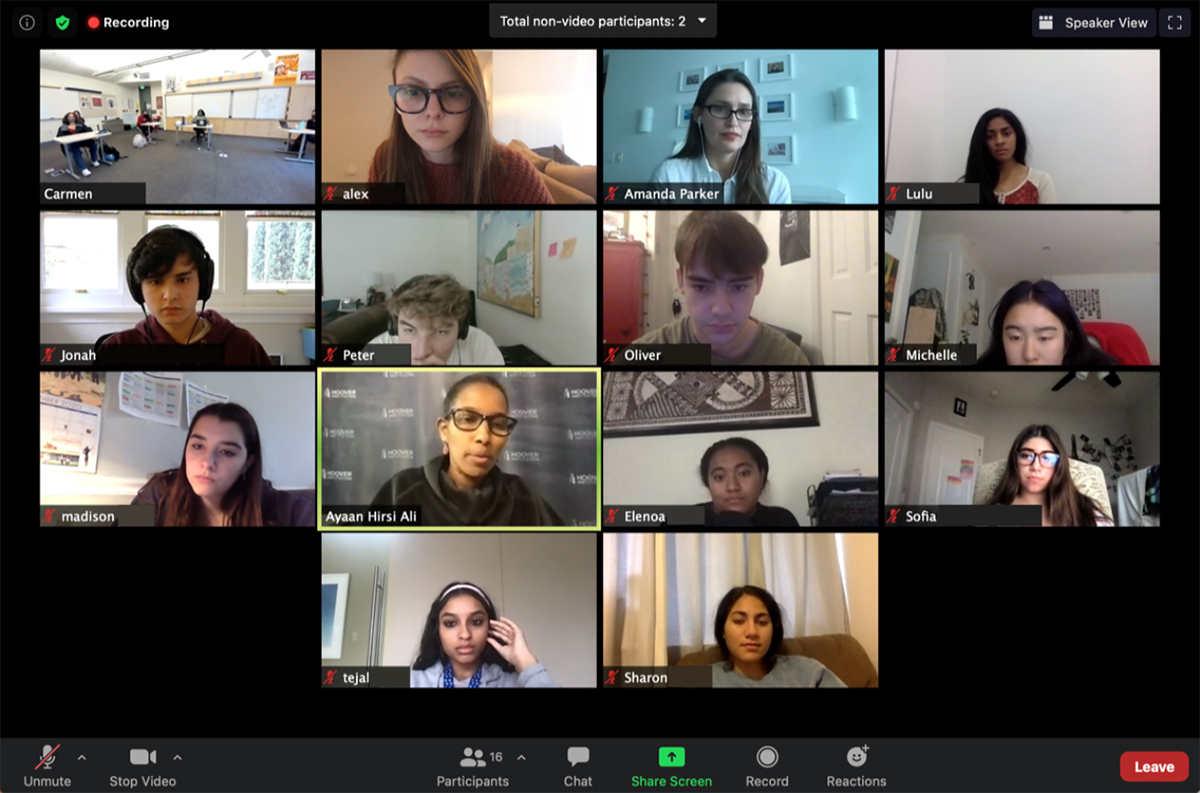
Ayaan Hirsi Ali and AHA Foundation’s Senior Director Speak About Female Genital Mutilation in the U.S. at Menlo School’s Ethnic Studies Class in California

DIRECT SERVICES,
TRAININGS AND OUTREACH
Although in-person trainings have been suspended for now, we have adapted them to work as online videoconferencing-based sessions. Through Zoom Webinars, we have the capability to host the same training sessions and presentations but with an audience that can attend from anywhere in the country.
The San Diego Conference:
In September, a conference where AHA Foundation typically leads a presentation each year in San Diego was held online instead. This was the sixth consecutive year AHA Foundation presented, with this year’s attendees comprised of social service professionals including counselors, social workers, and healthcare providers and outlined the information they need to support populations at risk of FGM.
Boise Training:
Just prior to shelter at home orders going into effect, a team from AHA Foundation piloted a training of trainers program in Boise, Idaho. The program highlighted cooperation between frontline service providers as a critical strategy to prevent and address FGM within the community. Approximately 20 healthcare providers and other professionals likely to encounter individuals impacted by FGM attended the training.
Future Training Plans:
AHA Foundation has explored partnerships with professional associations such as the American Medical Association, the American Bar Association, and the American Public Health Association to scale up online trainings for the future. We hope to work with professional associations to provide easily-accessible, accredited trainings on addressing the problem of FGM.
DONOR REFLECTIONS
Her [Ayaan’s] story and strength resonated with me and motivated me to do more about gender-based violence…We must stop putting women and girls at risk of these practices for the sake of political correctness. The overarching concern should be consent, and the victims are too young to consent to their victimization. Imagine being a child and being forced to marry a much older man!
Michael Cavallo, Massachusetts
Ayaan Hirsi Ali has been my hero for many years. Thank you for all you do. I have encouraged both of my two oldest granddaughters to read ‘Infidel.’ Hopefully, when I am gone and can’t share your message, they will share your message. Even better, I hope and pray, they will live in a world where FGM, forced marriage and honor killings are eradicated. What a wonderful world that would be.
Beth Powers, pictured with her granddaughter, Indiana
I remember talking to my family about FGM prevalence in the U.S. and my aunt guided me towards Ayaan. I watched her interview on Fox News where she was talking about FGM and how women were no longer protected in the United States.
It was probably then when I became adamant about helping to stop it. Thankfully, Ayaan and AHA Foundation do the hard work and really all I have to do is spread the word and help contribute financially.
I really felt like this was something that needed to end as soon as possible, and I was one of the people that could help do that. I was blessed to have some extra savings right now and I think that people in my age group are probably struggling, especially right now, to start their careers but I was in a fortunate situation where I knew I could help.
I really love AHA’s dedication to ending all barbaric practices. I hope that there will be a day when humanity can say that they don’t even remember a time when abuses like these used to flourish. There will be a day when we end FGM.
Jaclyn Soneff, Colorado
Rarely is there a book that truly changes one’s world view. ‘Infidel’ was one of those books for me. In 2014, I read Ayaan Hirsi Ali’s book and proceeded to buy three copies for my family as well as touting her amazing journey and intellect to anyone who would listen. Her strength, perseverance and advocacy for women’s and children’s rights is truly inspirational.
Nicole Vanderheiden, New Hampshire

LOOKING AHEAD
2020 has been a hurricane of a year that I suspect will go down as a pivotal point in history. This hurricane will carry over into the beginning of 2021, and regrettably, there will be more hardships as a result. But we have learned many valuable lessons.
At AHA Foundation, we have found that we can work effectively with state legislators sponsoring bills to end FGM and child marriage without always traveling there to testify and educate politicians. We have learned that we can expand our campus program, the Critical Thinking Fellowship, through online trainings and that our webinars can reach even more students than our previous on-campus events. We have learned that we can build a large network of committed activists online, not only in person.
These discoveries have opened new frontiers for our work. In 2021, we will take all these lessons and apply them so that we can become even more efficient and productive in reaching our goals. Eleven states and the District of Columbia still need laws to ban FGM. We will work to get those laws passed. Laws to end child marriage still need to be passed in 46 states, the District of Columbia and in our federal visa criteria. But laws are only the first step.
Training medical providers and other professionals about how to identify these abuses, work towards their prevention, and respond appropriately are our next undertakings. We will continue to raise awareness and call for action on social media and we will be hosting webinars on FGM for the American Bar Association and the American Medical Association.
The Critical Thinking Fellowship Fellowship Program is growing faster despite the pandemic, and in 2021, we hope to double the number of fellows and exceed 1,000,000 views on social media platforms.
The vision we pursue and the programs we promote are not partisan. The COVID-19 crisis has not deterred us! The word for ‘crisis’ when written in Chinese is made up of two characters: danger and opportunity. AHA Foundation understands the danger in this crisis. Many more girls are at heightened risk! Debates on college campuses have been put on hold. The tragedies in Paris and Vienna demonstrate that extremists won’t stop during a pandemic.
But, we have seized many opportunities during 2020 and we are even better prepared to increase our work and expand our programs in 2021. Join with us by sharing your resources, writing to your legislators, sharing our vision and programmatic content online and by word of mouth! And thanks again for your support!






